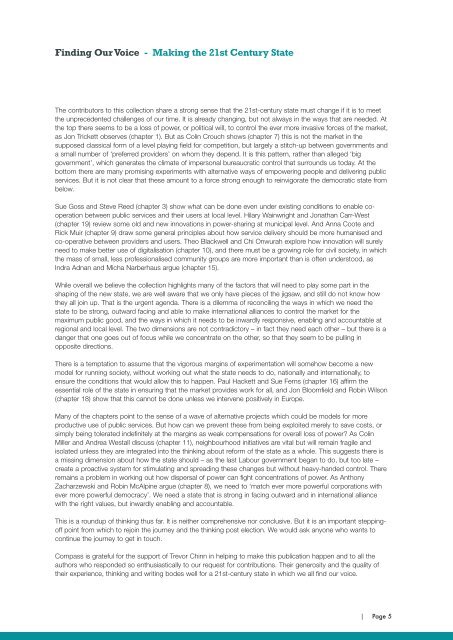Compass-Finding-Our-Voice-Final1
Compass-Finding-Our-Voice-Final1
Compass-Finding-Our-Voice-Final1
You also want an ePaper? Increase the reach of your titles
YUMPU automatically turns print PDFs into web optimized ePapers that Google loves.
<strong>Finding</strong> <strong>Our</strong> <strong>Voice</strong> - Making the 21st Century State<br />
The contributors to this collection share a strong sense that the 21st-century state must change if it is to meet<br />
the unprecedented challenges of our time. It is already changing, but not always in the ways that are needed. At<br />
the top there seems to be a loss of power, or political will, to control the ever more invasive forces of the market,<br />
as Jon Trickett observes (chapter 1). But as Colin Crouch shows (chapter 7) this is not the market in the<br />
supposed classical form of a level playing field for competition, but largely a stitch-up between governments and<br />
a small number of ‘preferred providers’ on whom they depend. It is this pattern, rather than alleged ‘big<br />
government’, which generates the climate of impersonal bureaucratic control that surrounds us today. At the<br />
bottom there are many promising experiments with alternative ways of empowering people and delivering public<br />
services. But it is not clear that these amount to a force strong enough to reinvigorate the democratic state from<br />
below.<br />
Sue Goss and Steve Reed (chapter 3) show what can be done even under existing conditions to enable cooperation<br />
between public services and their users at local level. Hilary Wainwright and Jonathan Carr-West<br />
(chapter 19) review some old and new innovations in power-sharing at municipal level. And Anna Coote and<br />
Rick Muir (chapter 9) draw some general principles about how service delivery should be more humanised and<br />
co-operative between providers and users. Theo Blackwell and Chi Onwurah explore how innovation will surely<br />
need to make better use of digitalisation (chapter 10), and there must be a growing role for civil society, in which<br />
the mass of small, less professionalised community groups are more important than is often understood, as<br />
Indra Adnan and Micha Narberhaus argue (chapter 15).<br />
While overall we believe the collection highlights many of the factors that will need to play some part in the<br />
shaping of the new state, we are well aware that we only have pieces of the jigsaw, and still do not know how<br />
they all join up. That is the urgent agenda. There is a dilemma of reconciling the ways in which we need the<br />
state to be strong, outward facing and able to make international alliances to control the market for the<br />
maximum public good, and the ways in which it needs to be inwardly responsive, enabling and accountable at<br />
regional and local level. The two dimensions are not contradictory – in fact they need each other – but there is a<br />
danger that one goes out of focus while we concentrate on the other, so that they seem to be pulling in<br />
opposite directions.<br />
There is a temptation to assume that the vigorous margins of experimentation will somehow become a new<br />
model for running society, without working out what the state needs to do, nationally and internationally, to<br />
ensure the conditions that would allow this to happen. Paul Hackett and Sue Ferns (chapter 16) affirm the<br />
essential role of the state in ensuring that the market provides work for all, and Jon Bloomfield and Robin Wilson<br />
(chapter 18) show that this cannot be done unless we intervene positively in Europe.<br />
Many of the chapters point to the sense of a wave of alternative projects which could be models for more<br />
productive use of public services. But how can we prevent these from being exploited merely to save costs, or<br />
simply being tolerated indefinitely at the margins as weak compensations for overall loss of power? As Colin<br />
Miller and Andrea Westall discuss (chapter 11), neighbourhood initiatives are vital but will remain fragile and<br />
isolated unless they are integrated into the thinking about reform of the state as a whole. This suggests there is<br />
a missing dimension about how the state should – as the last Labour government began to do, but too late –<br />
create a proactive system for stimulating and spreading these changes but without heavy-handed control. There<br />
remains a problem in working out how dispersal of power can fight concentrations of power. As Anthony<br />
Zacharzewski and Robin McAlpine argue (chapter 8), we need to ‘match ever more powerful corporations with<br />
ever more powerful democracy’. We need a state that is strong in facing outward and in international alliance<br />
with the right values, but inwardly enabling and accountable.<br />
This is a roundup of thinking thus far. It is neither comprehensive nor conclusive. But it is an important steppingoff<br />
point from which to rejoin the journey and the thinking post election. We would ask anyone who wants to<br />
continue the journey to get in touch.<br />
<strong>Compass</strong> is grateful for the support of Trevor Chinn in helping to make this publication happen and to all the<br />
authors who responded so enthusiastically to our request for contributions. Their generosity and the quality of<br />
their experience, thinking and writing bodes well for a 21st-century state in which we all find our voice.<br />
| Page 5


